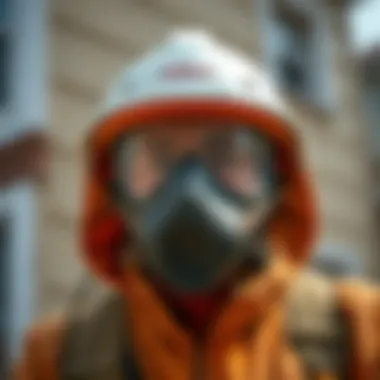Effective Pest Control Strategies in Levittown, PA


Intro
Pest control is a crucial aspect of maintaining a healthy and serene living environment, especially in places like Levittown, PA. Inhabitants of this suburban community often find themselves battling pests that can disrupt everyday life. This article will delve into the effective pest control strategies suitable for the region, focusing on what homeowners and renters can do to mitigate and manage common pests.
Understanding the types of pests that commonly invade homes in Levittown is the first step in safeguarding one's living space. Also, grasping how to identify these nuisances and their signs can lead to timely intervention. Furthermore, there’s a wealth of prevention techniques to consider that can assist in keeping your home pest-free. We'll also explore eco-friendly options to handle these issues, ensuring not just effective pest management but also a commitment to environmental responsibility.
Overall, this article offers insights that can empower homeowners, housewives, and pest control professionals alike, providing a well-rounded understanding of practical pest management approaches tailored specifically for Levittown. Let's embark on this journey toward a pest-free home.
Understanding Pest Control
Understanding pest control is essential for maintaining the comfort and safety of our homes, especially in a place like Levittown, PA. Effective pest management is not just about eliminating unwanted insects or rodents; it also involves a thorough grasp of the ecosystem and the habitats that these pests thrive in. Homeowners and renters alike must familiarize themselves with pest behavior and local species to devise strategies that will keep their homes pest-free long-term. By understanding the dynamics of pest control, one can better arm themselves against infestations before they escalate, potentially saving a lot of hassle and expense down the road.
Definition of Pest Control
Pest control refers to the practices and measures taken to manage and eliminate different types of pests that can cause harm to human health, property, or the environment. Pests can range from insects like cockroaches and ants to larger creatures such as raccoons and squirrels. The goal of pest control is not only to eradicate pests but also to prevent future infestations through various methods. These may include chemical treatments, traps, biological control methods, and integrated pest management solutions. It's not just about getting rid of the critters; it's about creating a balanced approach to management that suits the specific challenges of an area.
Importance of Effective Pest Management
Effective pest management plays a crucial role in our daily lives. It not only protects the integrity of our homes but also our health. Pests can transmit diseases, contaminate food, and damage property, leading to costly repairs and health hazards. In Levittown, where seasonal changes influence pest activity, understanding effective management becomes imperative. Here are some key points that underline its importance:
- Health Protection: Many pests are carriers of harmful diseases. For instance, mosquitoes can transmit West Nile virus, and rodents can carry hantavirus. By managing these pests effectively, one can significantly reduce health risks.
- Economic Savings: Proactive pest control often costs less than dealing with a full-blown infestation. By addressing issues early on, you save on potential repairs and treatment costs.
- Enhanced Quality of Life: Living in a pest-free home contributes to peace of mind. No one wants to share their living space with uninvited guests that can disrupt daily activities and comfort.
In light of these factors, understanding pest control is a vital skill for any homeowner or renter. The peace of mind that comes from effective pest management cannot be overstated.
"Preventing a pest issue is always easier and less costly than dealing with one that has gotten out of hand."
Common Pests in Levittown, PA
Understanding the common pests in Levittown, PA is crucial for effective pest management and maintaining a healthy living environment. These pests can infest homes, cause damage to property, and even compromise the health of residents. Identifying which pests are prevalent in the area allows homeowners to take proactive measures, tailoring prevention and control strategies appropriately. Furthermore, local knowledge about pest life cycles and habits can inform when and how to prepare for seasonal challenges. Ultimately, recognizing the specific pests can ease the burden of dealing with unwanted visitors.
Identifying Local Pests
In Levittown, multiple pests make themselves at home, often without invitation. Recognizing these pests can be half the battle fought. Key pests include ants, roaches, rodents, and termites. Each of these critters brings its own set of challenges.
- Ants – Often found scurrying along sidewalks and in gardens, these tiny invaders can find their way into kitchens, searching for food sources. Many varieties, like the odorous house ant, are common in Levittown. A keen eye can help spot their trails.
- Roaches – The German cockroach is notorious in urban environments. These pests thrive in moist, warm spaces like bathrooms and kitchens. Identifying their droppings and egg cases can aid in early detection.
- Rodents – Mice and rats seek shelter, especially during colder months. Look for gnaw marks, droppings, or nests in hidden areas.
- Termites – Known as the silent destroyers, termites can wreak havoc. Signs include discarded wings, mud tubes, and hollow-sounding wood.
By familiarizing oneself with these pests, homeowners can better detect infestations and tackle problems before they escalate. Identifying these pests early can minimize damages and simplify eradication.
Impact of Seasons on Pest Activity
Pest activity in Levittown fluctuates with the seasons, which is important for homeowners to note. Understanding this seasonal behavior can empower residents to take preventive measures at the right times of year.
- Spring – As temperatures warm up, pests like ants and termites become more active. Their search for food begins as they emerge from hibernation. Homeowners should inspect for potential entry points and maintain cleanliness to deter infestations.
- Summer – This is peak season for many pests. Ants are in full swing, while flies, mosquitoes, and wasps also become more noticeable. Gardens and outdoor gatherings may attract these nuisances. Residents should consider trapping or using repellents during social events.
- Autumn – As the weather cools, pests like mice seek warmth indoors. It's crucial to seal openings around homes and clear out potential nesting materials, such as piles of debris.
- Winter – While some pests die off or go into hibernation, others may still lurk in walls and attics. Continuous monitoring can help identify any late arrivals looking for shelter.
By aligning pest control strategies with seasonal patterns, homeowners can significantly cut back on infestations and maintain a more pleasant residence year-round.
"Being proactive, rather than reactive about pest control can save time, money, and headaches in the long run."
Prevention Techniques


Prevention techniques are essential for maintaining a pest-free environment in Levittown, PA. Understanding and implementing these practices can save homeowners considerable time, effort, and money in the long run. The crux of pest control lies not just in reacting to infestations but importantly in preventing them from occurring in the first place. By adopting sound prevention methods, residents can manage their homes effectively and reduce the likelihood of unwelcome critters making an entrance.
Basic Prevention Practices
Common sense goes a long way when it comes to pest prevention. Here are some foundational practices:
- Keep Clean: Regularly clean floors and countertops to remove food debris that attracts pests.
- Seal Entry Points: Check for cracks and gaps around windows and doors. Even small openings can serve as gateways for pests.
- Proper Waste Management: Ensure that trash is stored in sealed containers. This simple step can significantly reduce the attraction of rodents and insects.
- Regular Inspections: Conduct seasonal checks of your home, looking for signs of pest activity. If you catch issues early, you can often handle them before they escalate.
By committing to these practices, residents in Levittown can drastically minimize the chances of a full-blown infestation.
Role of Landscaping in Pest Control
Landscaping can be both a friend and foe when it comes to pest control. Making mindful choices in your outdoor space promotes a healthy, pest-resistant environment. Consider the following:
- Plant Selection: Certain plants are natural repellents. For instance, marigolds can deter nematodes and mosquitoes.
- Mulching Wisely: While mulch is great for gardens, too much can create a habitat for pests. Aim for a balanced approach that provides enough coverage without inviting trouble.
- Trimming Trees and Shrubs: Maintain a well-groomed landscape. Overhanging branches can act as bridges for pests to enter your home.
- Water Management: Standing water attracts mosquitoes. Ensure proper drainage around your property to evade these pests.
Implementing thoughtful landscaping strategies can create a less inviting atmosphere for pests, enhancing not just curb appeal but also home safety.
Using Physical Barriers
Physical barriers serve as the first line of defense against pests. These include methods that actively block entry and disrupt pest movements:
- Screens: Make use of window and door screens to keep out flying insects while allowing fresh air in.
- Fences: Installing fences can help keep larger pests like deer and rabbits from wandering into gardens.
- Traps: Utilizing traps instead of chemicals is a more sustainable option that can monitor and control pest populations without extensive chemical use.
- Sealed Storage: Use airtight containers to store food and pet supplies, thwarting pest access.
The implementation of physical barriers empowers residents to combat pests effectively before they enter the home environment, maintaining the integrity of indoor spaces.
Eco-Friendly Pest Control Options
In recent years, eco-friendly pest control options have gained considerable traction. The growing awareness about the environment's health and safety has sparked interest among homeowners and pest control professionals alike. It's not just about getting rid of pests; it’s about doing so in a manner that doesn’t harm the ecosystem. Implementing these strategies is meaningful for both the immediate environment and future generations.
Natural Pest Deterrents
Natural pest deterrents serve as a crucial element in the eco-friendly pest control realm. They are not only safer for humans and pets but also minimize chemical runoff into local water systems. Homeowners can use commonplace substances, such as vinegar, essential oils, or even garlic, to repel pests without introducing harmful toxins into their surroundings.
- Vinegar: A mixture of water and vinegar in a spray bottle can keep ants and fruit flies at bay.
- Essential Oils: Peppermint and lavender oils, when diluted with water, serve as natural repellents for spiders and mosquitoes.
- Garlic: This common kitchen staple can help deter pests if mixed in a spray solution, offering a pungent barrier against various insects.
It's essential to apply these solutions consistently. Pests often return if these barriers are sporadically used. By adopting natural pest deterrents, you not only reduce your reliance on chemical pesticides but also foster an environment that is more balanced and harmonious.
Organic Solutions to Pest Problems
When it comes to organic solutions, the emphasis is on utilizing substances derived from natural sources rather than synthetic chemicals. Organic solutions aren’t just kinds of pest control; they are rooted in the philosophy of sustainability and respect towards nature. Recognizing that the health of our surroundings is intricately connected to our own health promotes a more conscientious approach to pest management.
Some notable organic methods include:
- Neem Oil: Extracted from the seeds of the neem tree, this oil disrupts the life cycle of pests without harming beneficial insects.
- Diatomaceous Earth: This fine powder is made from fossilized algae. It works by dehydrating insects that come into contact with it. Not only is it effective, but it’s also safe for plants and animals when used as directed.
- Soap Sprays: A simple mixture of liquid soap and water can effectively control soft-bodied insects like aphids and mites.
These organic approaches foster a safer living environment while being effective against bugs that can infiltrate homes. By carefully considering the effects of each method on the entirety of the ecosystem, homeowners can craft a pest control strategy that remains effective and preserves ecological integrity.
"The goal of effective pest control is not just about eradicating pests; it is about maintaining a healthy coexistence with the surrounding ecosystem."


Overall, eco-friendly pest control options align perfectly with modern values seeking both environmental sustainability and effective pest management. Raising awareness and implementing these methods is key to paving the way for more sustainable living in Levittown and beyond.
Professional Pest Control Services in Levittown
In Levittown, the battle against pests is a real concern for homeowners. Professional pest control services play a crucial role in not just removing these nuisances but also in preventing them from coming back. Investing in expert services means you're relying on trained professionals who understand the local pest landscape and can offer tailored solutions based on specific infestations. This investment can often save homeowners from the stress and potential financial losses associated with pest infestations.
Choosing the Right Pest Control Company
When it comes to selecting a pest control company in Levittown, it's essential to do your homework. Not all companies are created equal, and finding the right one can make a significant difference in the effectiveness of your pest management strategy. Start by looking for licensed providers; only then will you know they adhere to local regulations and standards. Reading customer reviews can also provide insight into a company's reputation, service quality, and success rates.
Some key considerations include:
- Experience: Look for companies that have been in the business for several years. They often have a deeper understanding of pest behavior specific to your region.
- Certifications: Ensure that the company employs certified technicians trained in the latest pest control methods.
- Service Plans: Some companies offer various service plans, ranging from one-time treatments to ongoing maintenance options. It can be advantageous to choose a flexible plan that suits your needs.
Understanding Treatment Options
Different pests call for different approaches. A reputable pest control company should explain all the treatment options available, allowing homeowners to make informed decisions. Common treatments include:
- Chemical Treatments: Often effective for a variety of pests, chemical treatments might include insecticides or fumigants. It’s essential to discuss the safety of these products, especially in homes with pets or children.
- Biological Controls: For eco-conscious homeowners, biological pest control uses natural predators or parasites to keep pest populations in check. This method can be effective and less harmful to the environment.
- Integrated Pest Management (IPM): This holistic approach combines multiple strategies to manage pests effectively. It may involve monitoring pest populations, preventive measures, and targeted treatments.
Always feel comfortable asking your chosen service provider questions about their methods and what is a best fit for your particular situation. Good companies will take the time to explain their processes.
Evaluating Cost versus Value
Price should never be the sole deciding factor when selecting a pest control service. While a lower price might be tempting, it’s crucial to evaluate what’s included in that cost. Consider the following:
- Comprehensive Assessments: Ensure the cost includes a thorough inspection of your property. This allows the company to develop a more effective pest management plan.
- Follow-Up Services: Some companies charge for initial treatments only to hit you with additional costs for follow-up visits. Choose a service that includes follow-up treatments in their plan.
- Satisfaction Guarantees: The best companies stand behind their services. If pests return after treatment, they should be willing to come back—at no extra charge.
When looking at the bigger picture, investing in quality pest control services can lead to long-term savings and peace of mind. A one-time quick fix might not be enough; think about the potential for future infestations and the costs that might incur without proper management.
In the end, ensuring your home remains pest-free starts with selecting the right professional services. A careful examination of your options can provide long-lasting value for you and your family's comfort.
Legislation and Pest Control Regulations
Understanding the laws surrounding pest control is crucial for homeowners and renters alike. In levittown, PA, these regulations not only help safeguard public health but also ensure that pest management practices are safe and effective. Regulations dictate how pest control companies operate, which methods are permissible, and what products can be used. Following these laws can protect you from potential legal issues and ensure your home's pest control treatments are executed safely and responsibly.
Local Laws Governing Pest Control
In Levittown, the local governing bodies oversee pest control practices. These laws cover a range of topics including the types of pests that can be treated, the chemicals that can be used, and even licensing requirements for pest control operators. For example, pest control companies are often required to obtain a license that shows they are trained and knowledgeable about safe pesticide application.
In addition to licensing, Levittown mandates that certain pest control strategies must be reported to municipal authorities. This might include the use of particular pesticides noted to be potentially hazardous to humans or pets. Awareness of these regulations can help residents choose the right service and avoid any questionable practices.
"Understanding local legislation is key to effective pest control and helps ensure a healthier living environment."
To navigate these local laws effectively, homeowners should consult resources such as the Pennsylvania Department of Agriculture, which provides guidelines and updates regarding pest management regulations. Moreover, keeping an eye on community guidelines can illuminate any recent changes that may affect pest control practices in your home.
Safety Standards for Pest Treatments
Safety standards in pest control are designed to minimize risks to human health and the environment. Levittown adheres to strict safety guidelines when it comes to using chemical treatments. For instance, pest control products must meet specific criteria set by the Environmental Protection Agency (EPA). These stipulations require products used in residential homes to have minimal health risks if applied correctly.


Homeowners must also be aware of the requirement for residential areas to implement safety measures during pest treatment. This can include:
- Notification: Residents should be informed prior to treatment, allowing them time to vacate if necessary, especially if harmful chemicals are being deployed.
- Child and Pet Safety: Pest control companies should use products that are safe for spaces frequented by children and pets. This could mean opting for eco-friendly alternatives whenever possible.
- Post-treatment Guidelines: Companies should provide clear instructions on how to behave in the aftermath of a treatment (e.g., when it is safe to return home).
To summarize, keeping up to date with legislation and safety standards not only ensures compliance but also guarantees effective and safe pest control solutions for your home. The laws and regulations set by local authorities serve as a check to ensure that pest treatments are carried out responsibly.
DIY Pest Control Methods
In the world of pest control, DIY methods have carved out a niche that appeals to homeowners and housewives alike. It's not just about throwing some poison in the corner and hoping for the best. Effective DIY pest control methods involve understanding the nature of the pests you’re dealing with, recognizing their habits, and employing strategies that minimize harm to you, your family, and the environment.
One of the key aspects of DIY pest control is that it provides a sense of empowerment. Homeowners can take charge of their living spaces, implement proactive measures, and save some bucks in the process. However, being an informed DIYer is essential. Not every pest can be dealt with the same way, and some methods may be more effective than others depending on the situation.
Common DIY Techniques
When it comes to DIY pest control, there are several techniques to consider:
- Soap and Water Sprays: For soft-bodied insects like aphids and spider mites, a simple mixture of dish soap and water can be an effective deterrent.
- Diatomaceous Earth: This natural powder can be dusted around the house to kill crawling insects like cockroaches and ants. It works by dehydrating them.
- Boric Acid: Often used for cockroaches, boric acid can be a reliable treatment when applied correctly. It should be used with care around pets and children.
- Essential Oils: Certain oils like peppermint or lemongrass can repel pests while adding a pleasant scent to your home. Mix a few drops in water and spray around entry points.
- Traps: Homemade traps for rodents or insects can be created from materials found around the house—like using a bucket and some soapy water to trap mice.
While these techniques can be quite effective, they also come with their own sets of considerations. For instance, some may require repeated applications to maintain effectiveness, while others might not be suited for all types of pests.
When to Call the Experts
Despite the benefits of DIY methods, there comes a time when professional assistance is warranted. Recognizing these moments can save homeowners a world of trouble.
- Infestation Severity: If pests have taken over your space, with signs of nests or heavy activity, it’s time to get the experts involved. An open bag of sugar attracting a swarm of ants is one thing, but a full-blown bedbug situation is entirely another.
- Unknown Species: Not all pests are created equal. When you're facing an unknown pest that you can't identify, calling in a professional is usually the best bet. Some insects can cause damage or pose health risks that require specialized knowledge.
- Safety Concerns: If there’s a risk involved, such as the presence of venomous spiders or the need for chemical treatments that could be harmful, trusting a licensed pest control service is a wise decision.
- Effectiveness of DIY Methods: If you’ve tried your hand at DIY techniques without success, don't hesitate to seek professional help. Just because it works for one pest doesn’t mean it’ll work for another.
"Understanding your options can lead to successful pest management without compromising the safety of your home."
For those interested in learning more about pest management tactics, resources from CDC.gov, EPA.gov, or even discussion forums on Reddit can provide additional guidance.
Future Trends in Pest Control
The world of pest control is continually evolving, much like the pests it aims to manage. Understanding these future trends is crucial for homeowners in Levittown, PA, who are on the lookout for effective, sustainable strategies. The integration of technology, alongside community efforts, is redefining how pest control services are approached. Staying informed about these developments not only prepares homeowners for better pest management but also fosters a more sustainable environment for everyone.
Technological Innovations
In recent years, advancements in technology have significantly shaped pest control methods. The rise of smart pest control devices, such as IoT-enabled traps, enables real-time monitoring of pest activity. For example, systems like TrapMe notify homeowners through a smartphone app when a trap has been activated, providing immediate responses to pest issues. These innovations streamline pest management, making it easier to address problems before they escalate.
Another exciting advancement is the use of drones for surveying and pest identification. Drones equipped with cameras can scan large areas quickly, identifying problem spots far faster than traditional methods. This technology allows for targeted treatments that minimize pesticide use. As a result, both effectiveness and environmental responsibility are enhanced, aligning with homeowners' growing preferences for eco-friendly solutions.
"Technology doesn't just help us track pests; it empowers us to manage them smarter, reducing both costs and environmental impact."
Additionally, the rise of AI in pest management is worth noting. Predictive analytics, driven by machine learning, can assist pest control professionals in understanding pest behavior patterns. This intelligence can lead to preventative measures that are proactive rather than reactive. Homeowners can benefit from tailored solutions that cater specifically to local pest populations and their habits.
Community Involvement in Pest Management
Community involvement in pest management presents another forward-thinking approach that is gaining traction. When neighborhoods come together to address pest problems, the effects are often profound. A cohesive pest management strategy can lead to a noticeable reduction in pest populations, benefiting everyone involved.
One way communities can engage is through educational programs. Informing residents about common pests and prevention methods fosters a collective responsibility for maintaining pest-free environments. Local workshops or online webinars can teach participants how to recognize pest signs, understand the life cycles of local species, and implement effective prevention strategies in their homes.
Moreover, community clean-up initiatives can play a pivotal role in pest control. Pests thrive in cluttered environments with plenty of hiding spots, so organizing community clean-up days can alleviate potential pest habitats. Not only do these efforts beautify public spaces, but they also lower the chances of infestations spreading.
Incorporating community-driven strategies, such as neighborhood monitoring networks, can also optimize pest management. By sharing information about pest sightings and effective treatments, residents can maintain a collaborative approach. Platforms like Nextdoor and Facebook groups serve as excellent avenues for sharing knowledge and experiences related to pest control, fostering a sense of community engagement.
With advancements in technology and the benefits of community efforts, the future of pest control offers promising solutions tailored for Levittown, PA, residents. Staying abreast of these developments positions homeowners to manage pest-related issues more effectively, ensuring their homes remain safe and comfortable.







